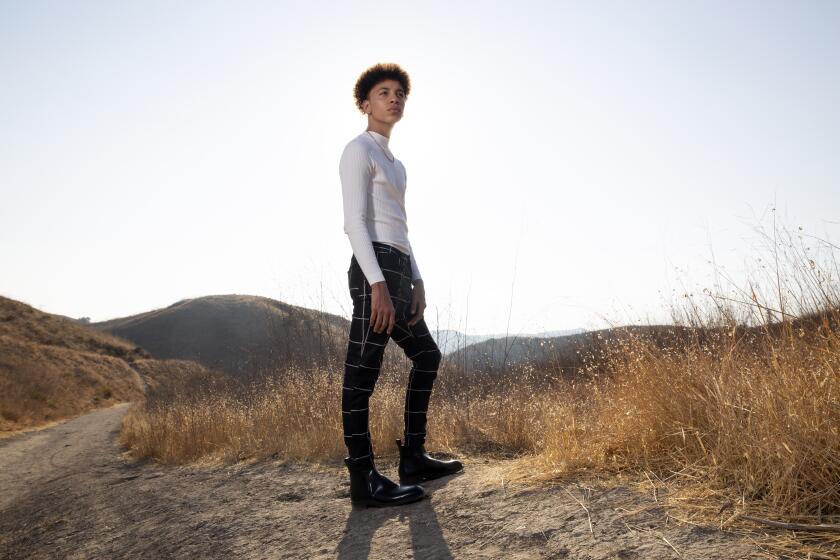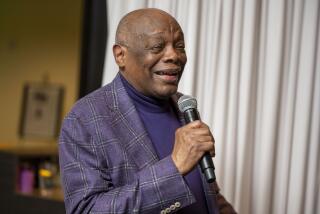Commentary: John Brown is the hero we need right now. And ‘The Good Lord Bird’ delivers
- Share via
Of the day following John Brown’s raid on the federal arsenal at Harpers Ferry, Va., in 1859 — now understood by scholars and schoolchildren alike to be one of the precipitating events of the Civil War — pioneering Black historian W.E.B. DuBois described a nation of doubters, uncertain of Brown’s legacy and hesitant to claim it. With the benefit of 50 years’ hindsight, though, DuBois himself had no such compunction.
“When a prophet like John Brown appears, how must we of the world receive him?” he asked in his 1909 biography of the antislavery crusader, combating Brown’s Jim Crow-era reputation as a bloodthirsty outlaw. “Only in time is truth revealed. Today at last we know: John Brown was right.”
Radical abolitionist and domestic terrorist, Confederate scoundrel and Union saint, Brown is among the most contested figures in American history, fated, perhaps, to be received as the world and the moment require. Which lends the earthy, slyly funny, utterly righteous portrait of Brown painted in Showtime’s “The Good Lord Bird,” based on James McBride’s raucous novel, its sense of urgency: We’ve rarely needed Brown the prophet more than we do now.
And in “The Good Lord Bird,” cocreated by Ethan Hawke and Mark Richard, Hawke’s Old Man Brown is neither the monster of Southern nightmares, nor the eccentric on the margins of Geraldine Brooks’ “March,” nor the martyr of Russell Banks’ “Cloudsplitter.” Here, as in DuBois’ analysis, he is our very own Cassandra, logic crystalline behind his cloudy eyes.
Joshua Caleb Johnson co-stars with Ethan Hawke in Showtime’s miniseries “The Good Lord Bird,” about John Brown’s fight to abolish slavery in the 1850s.
“I’ve been called crazy before, a fool,” he explains to his skeptical ally, Frederick Douglass (Daveed Diggs), of his plan to escalate the attack on the country’s original sin. “But I know there will be no friendship with the slaveholding man until he is soundly beaten, holds himself accountable and asks for forgiveness. Then we can discuss friendship.”
Combing his mustache with a fork and offering a $2.50 bounty for the head of President James Buchanan, his interminable, rambling sermons spliced into a comic montage, this Brown can be difficult to take seriously — a poignant reminder that, like most prophets, he wasn’t.
After all, even the most ardent white abolitionists stopped short of Brown’s “Provisional Constitution” of the United States, which not only posited the end of slavery but sought to establish full and equal citizenship for all regardless of race, sex or prior condition. (As David S. Reynolds notes in his indispensable cultural biography “John Brown: Abolitionist,” Brown’s own lawyer later cited the document as evidence of Brown’s insanity.)

“The Good Lord Bird,” with its telling disclaimer — “All of this is true. Most of it happened.” — transforms this constitution into a “Declaration of Liberty,” but its rendering captures the essence of Brown’s project just the same. As he asks a gathering of his predominantly white followers to sign on to the credo, the scene settles instead on those with a personal interest in its promise of freedom: first a Native man, on the porch of the cabin, and then two Black men in coveralls, emphasized by the camera’s straight-ahead posture and the high shriek of the score’s strings.
In this, the series alludes to the central feature of Brown’s crusade. He knew, as even Abraham Lincoln had yet to realize, that no plan to abolish slavery in America could succeed without involving the oppressed in their own liberation — and that the fight must be waged outside the institutions in which, as the Supreme Court found in Dred Scott vs. Sandford, the Black man “had no rights which the white man was bound to respect.”
Brown, who reviled that decision in a letter from prison as he awaited execution — and had, according to Reynolds, likely declined to vote in any presidential election since the early 1830s — became alienated from the political process precisely because “politics” excluded those most in need of its influence. The implication of his “Provisional Constitution” was not only that women, people of color and former slaves deserved equal rights going forward. It was that, in failing to protect those rights, the Constitution adopted in 1787 and the government it created were fundamentally illegitimate.
Director Marielle Heller’s film of the Broadway show hits Amazon this week. With Amy Coney Barrett’s hearings underway, the timing couldn’t be better.
For Brown, God’s law trumped man’s, and the Lord, as he often said, is no respecter of persons. But one need not believe in a higher power to recognize the abhorrent amorality of the Supreme Court’s decisions in Dred Scott, Plessy vs. Ferguson or Korematsu vs. United States, all of which witnessed the triumph of political power over human decency. Nor need one credit each incremental advancement as a victory for democracy.
As Heidi Schreck points out in her great American tragicomedy “What the Constitution Means to Me,” even progress can come at the cost of legitimacy: Griswold vs. Connecticut, which decriminalized birth control for women — provided they were married and had the permission of their husbands — was decided by nine men.
For those historically cut out of the body politic, Brown’s lesson, conveyed with such wit and vigor in “The Good Lord Bird,” is to reject the rules set by those who would keep you out of the game in the first place, and thence to write your own.
“John Brown always said, ‘Be mild with the mild, shrewd with the crafty, rough to the rough. With a liar, be a thunderbolt,’” remembers the series’ narrator, a young ex-slave nicknamed Onion (Joshua Caleb Johnson) who is swept up by Brown’s band on the Kansas frontier. “What that meant was, you can lie your ass off to anyone who doesn’t believe all people’s equal.”
If the evolution, expansion and achievements of nonviolent resistance under the likes of Mahatma Gandhi and Martin Luther King have changed the complexion of Brown’s recourse to violence, “The Good Lord Bird” still depicts the abolitionist as operating on the same underlying principle — as, indeed, did the founders. The legitimacy of our institutions depends on the consent of those governed by them, and when that consent is withdrawn, the legitimacy is lost.
Where the question of legitimacy becomes thorny, and where “The Good Lord Bird’s” treatment of Brown’s radicalism is so powerful, is at the heart of our own fraught moment. In an unjust system, the ballot — the foremost mechanism for delivering and withdrawing consent — is a defective weapon, rendered impotent not only by violence and intimidation but also by our vaunted “rule of law.”
It has been said of every presidential election I can remember that this election is the most important of our lifetime, that the very fabric of democracy is on the ballot. But what if access to that ballot is limited by race, class or political affiliation? What if the district in which that ballot is cast has been gerrymandered to partisan advantage, or the state in which it is counted is underrepresented in the electoral college? What if courts shaped by those with power, to the disadvantage of those without it, determine that ballot should not be counted at all? Is the government that emerges from such a process legitimate, and if so, to whom?
“If any are bound, we are all bound,” Hawke’s great agitator proclaims in a speech to an antislavery society at the start of Sunday’s episode. And as DuBois had it a century ago, John Brown was right: If Black lives are on the ballot, he understood — if immigrant families are on the ballot, if women’s bodies are on the ballot, if queer rights are on the ballot — then we have already lost.
‘The Good Lord Bird’
Where: Showtime
When: 9 p.m. Sunday
Rating: TV-MA (may be unsuitable for children under the age of 17)
More to Read
The complete guide to home viewing
Get Screen Gab for everything about the TV shows and streaming movies everyone’s talking about.
You may occasionally receive promotional content from the Los Angeles Times.








